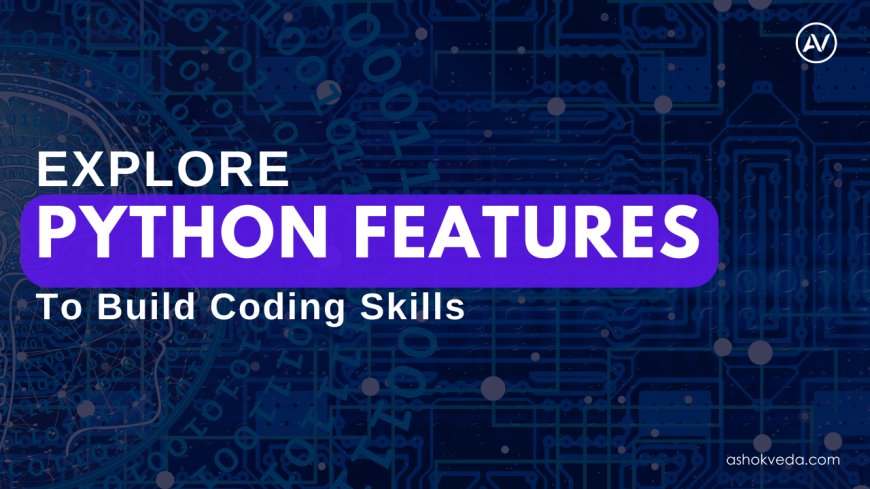Python Features That Improve Your Coding Skills
Discover Python features that enhance your coding skills, including list comprehensions, decorators, generators, and context managers.

Python Features That Improve Your Coding Skill, which makes it a popular option for people who want to become better programmers. Python's simple syntax, which is similar to natural language, is one of its key features. It makes programming accessible to novices and frees up experienced developers to concentrate more on problem-solving than complex syntax. Additionally, those who choose to pursue a career in Python can benefit from the rich standard libraries of Python, which offer tools for a wide range of applications, including web development and data analysis.
This reduces the need for lengthy codewriting and expedites development. Python provides a versatile and stable environment that supports various programming paradigms, such as procedural, object-oriented, and functional programming. The strong community support that Python Features That Improve Your Coding Skills offers is another important component. Through discussions, conferences, and directs, on the latest Python features and best practices.
Readability and Simplicity
Python's syntax is meant to be easy to read and understand, so even non-programmers may utilize it effectively. Compared to other languages, it requires fewer lines of code and has a clear structure with keywords that are similar to those in English. Writing, programming, and debugging become easier with this design. Python requires indentation for block definitions rather than braces, which improves code consistency and readability even further.
Comprehensive Standard Library
A large number of modules and functions covering a wide variety of activities frequently encountered in programming are available in Python's significant standard library. These modules contain tools for a variety of activities, including networking, data manipulation, file I/O, and more. Python programmers can focus on solving particular problems rather than having to reinvent the wheel by utilizing the standard library. This makes development easier by offering pre-made solutions that follow the regular and consistent syntax of Python. In the end, Python programmers benefit from increased productivity and a quicker development process thanks to the large standard library.
Integrated Development Environments (IDEs) and Tools
The features and functionalities of Python-compatible Integrated Development Environments (IDEs), such as PyCharm, Visual Studio Code (VS Code), and Jupyter Notebook, are customized to meet the requirements of Python developers.
-
JetBrains was created by PyCharm, a feature-rich integrated development environment (IDE) with built-in version control integration, refactoring tools, and code completion.
-
Python is supported by extensions in Microsoft's code editor, VS Code, which is small and flexible. It offers functions like debugging support, code completion with IntelliSense, and a vast array of extensions to customize the development environment.
-
An open-source web program called Jupyter Notebook enables interactive computing and data visualization. Python programmers can use it to generate and share documents with live code, formulas, graphics, and narrative text.
Because each of these IDEs has advantages over the others and supports a variety of tastes and work processes, Python programmers can select the one that best meets their requirements.
Features and Benefits
|
Feature |
Benefit |
|
Code Completion |
Saves time by suggesting and completing code snippets |
|
Linting |
Identifies and helps fix syntax and style errors |
|
Debugging |
Facilitates locating and resolving program errors |
Object-Oriented and Functional Programming
Python supports both Object-Oriented Programming (OOP) and Functional Programming (FP) paradigms, offering flexibility in coding styles.
In Object-Oriented Programming, Python allows the creation of classes and objects, enabling encapsulation, inheritance, and polymorphism.
Functional Programming in Python involves using functions as first-class objects, supporting features like lambda functions, map, filter, and reduce functions, and list comprehensions.
Python supports a variety of paradigms, developers can select the best strategy for their needs, resulting in code that is easier to read and maintain.
Exception Handling
Python's error and exception handling features enable programmers to deal with possible runtime errors during program execution in an effortless way. Try-except blocks allow programmers to anticipate possible problems and define the program's response in case they arise. Furthermore, Python offers the capability to use the final block to execute cleanup code even in the absence of an exception or to catch particular kinds of errors. This method allows for regulated error handling and recovery, prevents unexpected crashes, and strengthens the robustness of Python programs.
List Comprehensions
Python's list comprehensions offer a clear and understandable method for generating lists from pre-existing lists. By iterating over items of an existing list and applying an expression or condition, they provide succinct syntax to create new lists. List comprehensions allow programmers to write fewer lines of code while still accomplishing the same goal as typical loops, which improves readability and clarity. This functionality makes code more concise and understandable and is especially helpful for tasks like filtering elements, converting data, or producing sequences.
Traditional looping techniques involve using constructs like loops to iterate over elements in a list and perform operations on each element individually. Here's an example:
# Traditional looping technique
numbers = [1, 2, 3, 4, 5]
squared_numbers = []
for num in numbers:
squared_numbers.append(num ** 2)
print(squared_numbers)
List comprehensions, on the other hand, offer a more concise way to achieve the same result:
# List comprehension
numbers = [1, 2, 3, 4, 5]
squared_numbers = [num ** 2 for num in numbers]
print(squared_numbers)
Both techniques produce the same output, but list comprehensions allow for a more compact and readable syntax, reducing the need for explicit looping constructs.
Asynchronous Programming
Python asynchronous programming allows for the simultaneous execution of processes, enhancing application responsiveness and performance. The asyncio module in Python offers resources for effectively handling asynchronous activities and creating asynchronous functions. Developers can identify asynchronous processes and coordinate their execution without causing a halt to the main thread by utilizing keywords such as await and async. This technique makes it possible for programs to manage file operations and network requests more effectively, which improves the overall responsiveness and scalability of Python applications.
Testing and Debugging Tools
Python comes with built-in debugging and testing tools, such as 'pdb' and 'unittest'. To help developers ensure their code is valid, the unit test module provides a framework for setting up and executing test cases. Claims are used to verify expected results, and test cases can be grouped into classes. On the other hand, the pdb module functions as a debugger, allowing programmers to view the way their code is being executed, place breakpoints, and interactively review variables and expressions. These built-in modules make it easier to write reliable and error-free Python programs by including tools for debugging and testing.
Community and Support
The Python community provides services such as forums, online communities, and collaborative websites to aid in the learning and skill-building of developers. Developers can collaborate on projects, exchange knowledge, and ask questions here. Meetups and conferences for Python enthusiasts provide additional chances for networking and knowledge sharing. Developers may stay up to date on new concepts, hone their craft, and advance Python programming by joining this group.
In conclusion. Developers can become more skilled programmers and improve their coding abilities by utilizing Python's capabilities. Using features like asynchronous programming, error handling, and list comprehension in their projects, developers can expand their knowledge of Python's features and obtain practical experience. Developers can actively include these characteristics into their coding practice to help them grow and get better over time. Examples of these features include using built-in modules for testing and debugging and interacting with the Python community for continuous learning. Thus, to improve as a coder, don't be afraid to experiment with Python's capabilities and apply them to your projects.





































